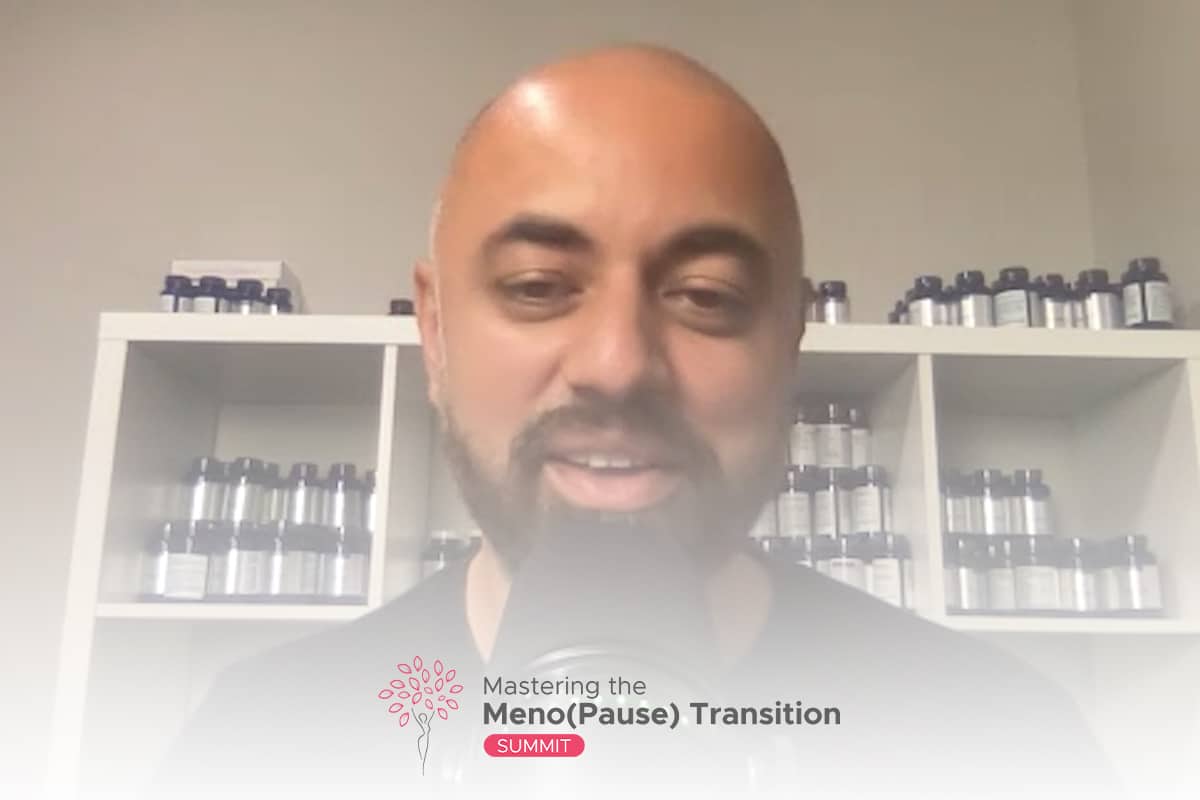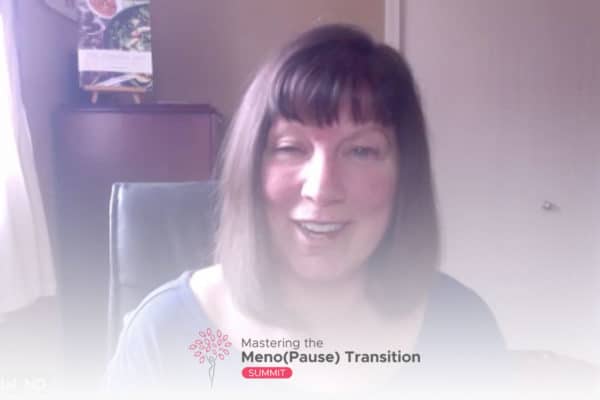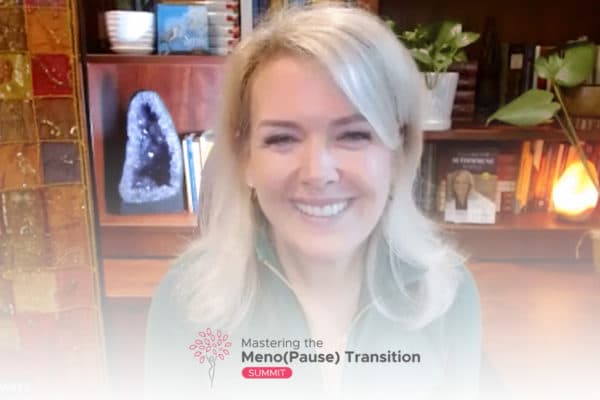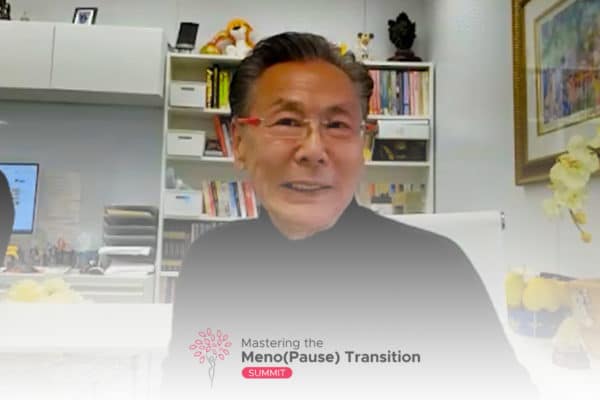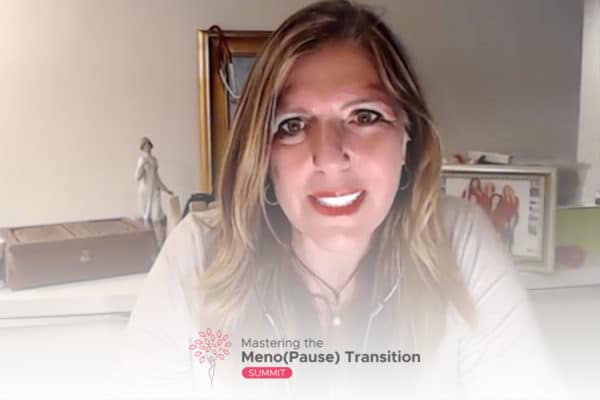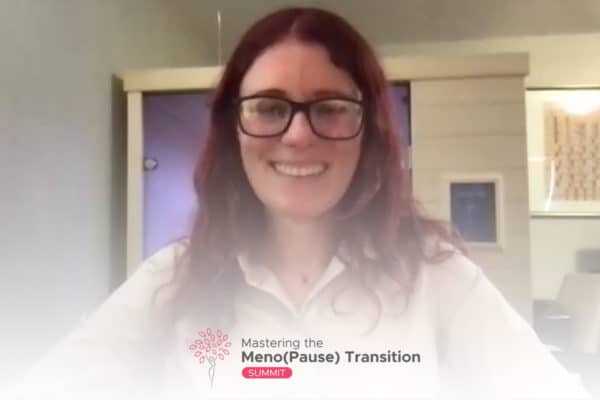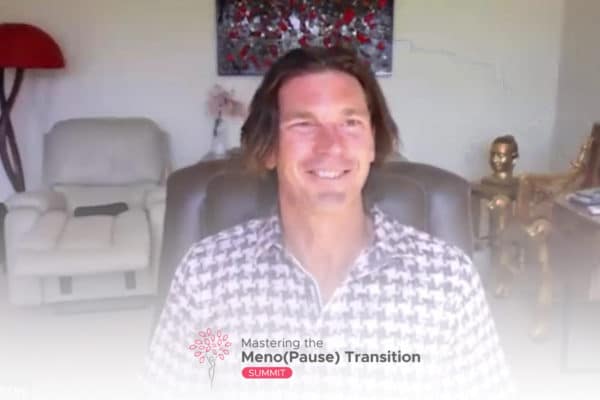Join the discussion below
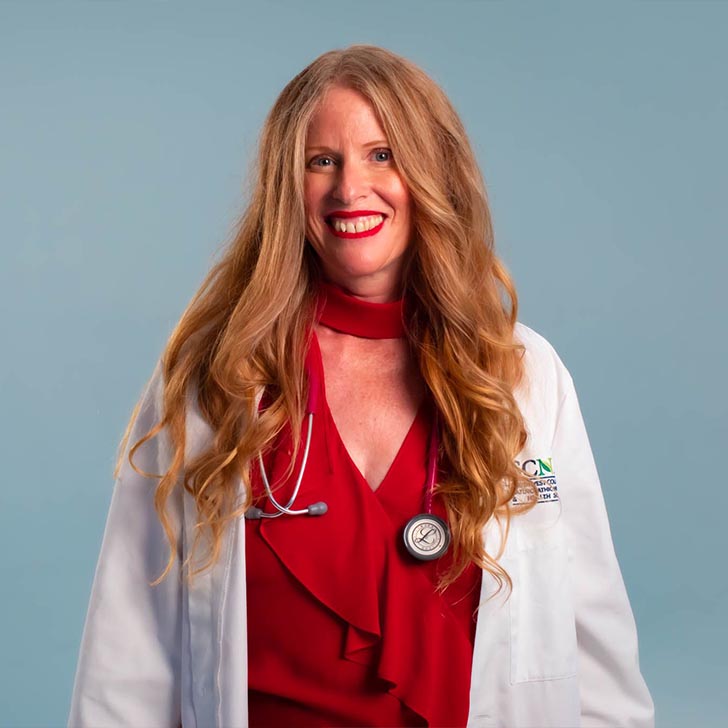
Dr. Sharon Stills, a licensed Naturopathic Medical Doctor with over two decades of dedicated service in transforming women’s health has been a guiding light for perimenopausal and menopausal women, empowering them to reinvent, explore, and rediscover their vitality and zest for life. Her pioneering RED Hot Sexy Meno(pause) Program encapsulates... Read More

Kashif Khan is the Chief Executive Officer and Founder of The DNA Company, where personalized medicine is being pioneered through unique insights into the human genome. With the largest study of its kind globally, The DNA Company has developed a functional approach to genomic interpretation overlaying environment, nutrition, and lifestyle... Read More
- Why do some women have a horrible menopause and some not?
- How our DNA drives our hormone cascade?
- What you need to check in your DNA before taking hormones?
Related Topics
Biological Function, Brca, Breast Cancer, Cardiovascular Disease, Chronic Diseases, Detox Pathways, Dna, Environment, Estrogen, Estrogen Dominance, Estrogen Toxicity, Gene Testing, Genetic Conditions, Genetic Or Epigenetic Expression, Genetic Reporting, Glutathione, Hormone Cascade, Hormone Dominance, Hormones, Individual Treatment, Inflammation, Ketosis, Lifestyle Factors, Menopause, Naturopathic Medicine, Nutrition, Personalized Medicine, Progesterone, Root Cause, Testosterone, Veganism, Womens HealthDr. Sharon Stills
Hi, everyone, welcome back to Mastering the Menopause Transition Summit. I’m your host, Dr. Sharon Stills. As always, a pleasure, a pleasure to be here with you. And we’re gonna have a really good talk today about a topic that’s probably at some point has been on your mind, and we’re gonna get some good answers. We all hear about genetics and epigenetics, and how it makes a difference and how our health plays out. And so I’ve got the man here to talk with us through it today and how it relates to you and your hormone. So I’m very happy and honored to be joined by Kashif Khan. He’s the chief executive offer and founder of The DNA Company, where personalized medicine is being pioneered through unique insights into the human genome. He’s also the host of the Unpilled podcast.
Growing up in Vancouver, Canada in an immigrant household, he developed an industrious entrepreneurial spirit from a young age. Prior to his tenure at The DNA Company, he advised a number of high growth startups in a variety of industries. As he dove into the field of functional genomics as the CEO of The DNA Company, it was revealed that his neural wiring was actually genetically designed to be entrepreneurial. However, his genes also revealed a particular sensitivity to pollutants. Now seeing his health from a new lens, Kashif drove further and further and started to see the genetic pathways that led to his own family’s challenges and the opportunities to reverse chronic disease. His measure of success is not in dollars earned, but in lives improved. I love that, I didn’t know that about you. Welcome. It’s really great to have you here.
Kashif Khan
No, thank you, it’s an honor, a pleasure.
Dr. Sharon Stills
So this is just such an important topic ’cause it’s such a game changer and it really is such a key part. There’s a few different things that contribute to personalized medicine, but really understanding someone’s genetic or epigenetic expression really can be the difference in why this works for you and doesn’t work for me.
Kashif Khan
Right.
Dr. Sharon Stills
And so I’m really excited to share this conversation with the ladies today. So let’s just, let’s just dive in. How do we know? What do we know about DNA in our hormones and?
Kashif Khan
Oh, there’s so much. We need a whole day. So, I mean, firstly, like 101 type stuff is that what we know we can glean from DNA is so much more than what we think because the interpretation has got a lot better. So testing is something that anybody can do, meaning you literally can go buy a DNA testing machine and put it in your garage and start testing DNA. It might be illegal, but you can still do it. The challenge there has always been outside of rare genetic conditions where a gene directly equals a problem. This gene was turned off. I have a certain version of it. Things like BRCA which we’ll talk about. Scary four-letter words that make you think, oh, I have propensity towards a disease. That was kinda the limit of genetics, which is what do I have a 80% chance of getting, right? That was kinda what genetics was which is why most people weren’t interested. It’s like I don’t wanna know if I have a 80% chance of Alzheimer’s. I’d rather just enjoy my life rather than have anxiety for 30 years.
So what was missing was the genes point to poor biological function, right? There’s something, if you have a good version of a gene or a bad version of a gene, you’re doing that job good or you’re doing it bad. That isn’t equal a problem except for rare genetic conditions. What it equals is bad biological function. What was then required is now that I have a profile, here’s what this person’s doing bad. What are the environment, nutrition, and lifestyle factors that then equal the problem? That’s how chronic diseases are formed. They’re not born with breast cancer or menopause problems or cardiovascular disease or Alzheimer’s. All these things happen later in life, because the body is very resilient, and those wrong choices you’re making the body will keep fighting until one day you get to a certain age and the hormone levels go down and the threshold gets crossed of how much nonsense your body can tolerate, and then the inflammation gets to a level where it turns into disease, right? So all we’re saying now is we’ve moved far, far away from your gene means you got a 80% chance of breast cancer to here’s why breast cancer happens. And if you know why, you can actually prevent it. Forget about fighting it, right? We’re way, way down that track now, and I think people need to learn a lot more about interpretation.
Dr. Sharon Stills
Hmm, yeah, I love the saying genetics loads the gun, but your epigenetics, your actions pull the trigger. And so.
Kashif Khan
For sure.
Dr. Sharon Stills
It’s not a sentence that this is your genes and this is we have it. It’s so empowering that we have the opportunity with the choices we make and the knowledge we get to to make a different expression, to go back towards health rather than marching towards disease.
Kashif Khan
For sure, and that’s been the challenge is nobody’s fault. They didn’t know what choices to make, right? The one-size-fits-all trial and error. Okay, I need to lose weight. I’m gonna go watch a YouTube video or listen to a podcast. It may work amazing. It may make you feel sick, right? Literally there’s some people genetically that we have to tell them cardiovascular disease will actually make you get sick. I’m sorry, cardiovascular exercise, sorry, will actually make you get sick, because the amount of oxidation produced by breathing in that much oxygen that you don’t have the genetic ability to clear starts suffocating your cells and causing inflammation. For some people, no problem. They can be a marathon runner their whole life. There’s some people we have to tell them, you can’t go on a keto diet.
Yeah, you might feel great in two weeks ’cause you’re in ketosis and the brain is firing and all these ketones make you feel so great, but a month, two months, three months into it, it’s gonna make you feel horrible. There’s some people we have to tell them, I’m sorry, the day you got sick was the day you decided to become a vegan. And that’s not true for everybody. But for some people, like the genes that create the enzymes to break down beans, lentil, legumes, chickpeas, it’s very clear. So if you don’t make those enzymes, how can you thrive as a vegan, right? But if you do, you may do very well as a vegan. You’ll feel great, then you’ll tell all your friends to do it. And one of them isn’t gonna do so well. So that’s where genetics can sorta guide you. Let’s remove the trial and error. Let’s remove the one-size-fits-all. And like, what do I need? What do you need? Here’s my instruction manual. What is it telling me?
Dr. Sharon Stills
It’s really the textbook definition of what naturopathic medicine is.
Kashif Khan
Right.
Dr. Sharon Stills
We treat everyone as an individual. We get to the root cause for you. And that, yes, unfortunately, because Aunt Mary had a great experience doesn’t mean you’re going to. It saves you so much time, because that is a lot of how healthcare gets spread in our society. You talk to your cousin, Jane, and, like, “Oh, I did this diet. “I lost 20 pounds.” And you’re like, “Oh, give me the book. “I wanna do it.” And it’s just not that simple. And as you said, it just can save you a lot of time and energy and problems. So how does DNA drive our hormones and what does it have to do with menopause? What do the ladies need to know? What are some of the big things you can check and help with?
Kashif Khan
So this is another part of genetic reporting that was broken. And I don’t say testing purposely, ’cause testing is testing. Everyone tests for DNA. You’re just figuring out what version of a gene you have. The interpretation is in the reporting. And gene reporting, if anyone here has done a genetic test, you probably got some document that says, gene, this, this version, gene, this, this version. So it tells you about each gene, right? But the body doesn’t work like that. The body, you have 22,000 genes that make up your genetic code. It’s not a bunch of independent, separate processes. You have systems. And hormones are such an important place to think of things in pathways and systems as opposed to each individual gene. And this is why most genetic reports don’t actually talk about hormones ’cause each gene on its own doesn’t tell you much. You need to understand the full cascade. So what is that cascade? You make progesterone, or you make progesterone, you convert that into testosterone, you convert that into estrogen, whether you’re a man or a woman. And in that process, there’s multitude of ways you can go.
There could be a very fast conversion of progesterone into testosterone based on what version of the gene you have. You could bypass the estrogen, and convert that testosterone into DHT, which is like the manly man version of testosterone that gives you a nice ripped six-pack, but your hair starts falling out, right? Or you could clear the androgen or the testosterone before you convert it into estrogen and have very low estrogen. Or you can have a big green light here that flows all of the testosterone into estrogen. You have a very heavy bucket. So what does that mean? You can understand, and this is one of three things you need to understand. What is your hormone dominance? What does your hormone profile look like? Are you estrogen-dominant? Are you androgen or testosterone-dominant? Are you co-dominant? You’re a little bit of both? Are you more balanced where you just have a little bit of both, right? So from that, you can start to predict what does your body look like? What does your skin look like?
What does your hair look like? What conditions may you be prone to if you add the epigenetic loads, right? So now, second, for women, important. If you’re estrogen-dominant, which so many of us, not me included, I’m not a woman. But so many women are, you may also be estrogen-toxic, which means before that monthly cycle, or even if you’re menopausal, you’re still creating and converting, you convert that estrogen, depending on what version of what gene you have, either into two, four, or 16 hydroxy estrogen. Two is great. It’s the good stuff that you want. Four and 16, potent toxins. You make toxins. Now if you’re in that bucket that you’re estrogen-dominant, you happen to fall in that path genetically, this is what you’re wired to do. And you’re also estrogen-toxic, so there’s a very heavy bucket of estrogen being converted into this potent toxin. That’s starting to not look so good. Now all of a sudden there’s an inflammatory insult that you’re making every single month. Step three, how do you get rid of it? There’s very specific genes that drive very specific clearance pathways, detox pathways. We’ve heard of glutathione and glutathionization. There’s antioxidation. There’s a gene called SOB2 that also supports that.
There’s COMP. A lot of women have heard about the COMP gene, which is at the tail end of what’s called methylation, and sort of takes the garbage out the door, right? That’s its job. So you could have any one of these sort of genes turning different dials at different levels. So you may be estrogen-dominant, you may be estrogen-toxic, and you may not clear that toxin so well. Here is a perfect storm for the woman who now epigenetically decided to go on birth control pills and add more estrogen, decided to go on hormone therapy without understanding where and when to intervene and what version and what type, more estrogen, isn’t familiar with the hormone disruptors in our environment. Chemicals, food, pesticides in your grass, Teflon-coated frying pan, all this stuff that you don’t know is mimicking estrogens, which again creates an additional.
That’s the woman for whom, no surprise, once you’re menopausal, you no longer have a menstrual cycle, and your body’s trying to figure out what to do with this toxin, it starts to store it in fat, which is in your breasts and your hips, and you start to get things like breast cancer and then you start to get things like ovarian cancer, and your menopause is a crazy rollercoaster. So what we believe, and it’s sad that I have to say this as a man, but what I find is in all the work we do, what is the most underserved medically? And I just say this as an ambassador of women now as a man, ’cause I’ve seen so much of it, is female hormone health. It sucks so bad. It is horrible, horrible, horrible. And the key thing, it’s just taken for granted that you’re supposed to have these problems. It’s your hormones. You’re a woman, live with it, right? When in fact this very gray stuff is so black and white. Here’s your map. Here’s what your body is doing with your hormones. Now you know exactly where and when to intervene to have a beautiful, balanced life as opposed to this roller coaster.
Dr. Sharon Stills
Exactly.
Kashif Khan
Right?
Dr. Sharon Stills
That’s why estrogen has been so demonized when if you just,
Kashif Khan
Right.
Dr. Sharon Stills
I love estrogen and it has so many beautiful health benefits, but you have to know all these pieces so you can use it
Kashif Khan
Yes.
Dr. Sharon Stills
Appropriately and you can be looking at what’s going on downstream and how. So I love, I love what you just said. And it is such an overlooked area. I think in mainstream medicine, it’s like, I don’t know, what were you guys doing in medical school? ‘Cause I was thinking critically. I was looking into these things.
Kashif Khan
It’s like you said earlier that medicine treats the symptom. So we have this really good acute care system. You break your arm, you have terminal cancer, someone’s gonna fix you, right? You respond to the emergency. That same toolkit is applied to chronic disease. And so when you think of female hormone problems, we’re dealing with the problems, endometriosis, fibromyalgia, bad menopause. We’re not dealing with the sole clear and obvious route, which is the hub of all of them, right? This one thing may cause three different problems. And now you’re treating them in three separate siloed events with three separate pills and three separate doctors when they’re all the same thing. They could just be estrogen toxicity. That’s the one thing driving all of this, right? It becomes gray because when you treat female hormone problems at the symptom level, they’re hard to measure, right? They’re hard to put into a bucket of some kinda clinical efficacy, because how is the person even perceiving it, to what degree, all that kind of stuff. And they’re hard to fix because you fix one and another one pops up, ’cause you didn’t get rid of the root.
Dr. Sharon Stills
Right, yeah, it’s really a symphony.
Kashif Khan
Yep.
Dr. Sharon Stills
So I wanna talk about like the BRCA genes, and if you could just kinda set the record straight on–
Kashif Khan
Sure.
Dr. Sharon Stills
What that all really means.
Kashif Khan
So it goes back to what I said. So I laid out the profile for why women get breast cancer at the menopause age, which I said, estrogen-dominant, estrogen-toxic, don’t clear it. There’s the profile. Now you gotta add the epigenetics, birth control pill. 85% of women will be on a birth control pill in North America for some elongated period. Hormone replacement therapy without first understanding, like working with somebody like yourself who knows what to give somebody, right? Not just random one-size-fits-all. Endocrine and hormone disruptors, now you’re adding a load.
Dr. Sharon Stills
Yeah, and I would add to that also my experience has been like patients unfortunately have gone through IVF.
Kashif Khan
Yeah.
Dr. Sharon Stills
And are put on all those strong meds. So that’s a big one I see too, like in a–
Kashif Khan
Yeah.
Dr. Sharon Stills
Working with a breast cancer patient who’s dealing with breast cancer, I see that a lot in the history.
Kashif Khan
Yeah, just month after month of progesterone and estrogen, loading them up, not knowing what they’re doing with it, right? So those are those loads that are fueling this bad profile. So that’s the woman for whom, once she reaches menopause, doesn’t have a menstrual cycle, the body wants to protect you, so it keeps the estrogen toxicity away from the organs and away from the vasculature, and it stores it in fat, which you have in your breasts with all these glands that are so sensitive that were not designed to deal with that level of toxicity, which leads to cancer. What we’re told is, oh, BRCA gene, let’s go cut a piece of you off to prevent cancer. What does the BRCA gene actually do? It doesn’t cause cancer, right? This is the misnomer. The BRCA is supposed to, it’s actually a repair tool. So it’s a tumor suppressor. So if you have breast cancer, BRCA is supposed to go fix it. So the reality is that if you have a certain version, the not so good repairman, you’re not doing a good job of repairs. So if you were to get breast cancer, it’s harder for you to survive. That’s what we’re saying about BRCA. There’s nowhere in there that it causes it.
Dr. Sharon Stills
But that’s what everyone thinks.
Kashif Khan
Yeah, and then by the way, that’s what most of the doctors think.
Dr. Sharon Stills
I know.
Kashif Khan
Right? Because they don’t dig into the why. When it comes to chronic disease, aging, all the poor disoptimal health, we don’t believe, in fact, we’re even asking why it’s shunned upon? Because that’s not part of the toolkit. The toolkit is check mark of success, the pain is gone. Whatever you’re complaining about, the rash, the pain, the thing, whatever, we’re gonna get rid of that, we’re not gonna ask why it happened or dig deeper. And if we got rid of it, success.
Dr. Sharon Stills
Right, and they never ask, like, so we got rid of it, but then where does it resurface when you suppressed it? ‘Cause it’s gonna show up again somewhere, and they never put those connections together.
Kashif Khan
Yeah. So you think you have the bad BRCA and you don’t repair tumors by cutting off your breasts. It may not happen somewhere else. If you’re still loaded up with estrogen toxicity and causing all the wrong habits that cause a cancer to express in the first place, yes, it’s much easier to come to fruition in the breast, but it may happen in your ovaries, it may happen somewhere else. So it’s so important to understand the why behind diseases as opposed to how do I mask diseases.
Dr. Sharon Stills
And I see it ’cause this is an area I work with a lot. It’ll just manifest in the chest wall.
Kashif Khan
Yeah.
Dr. Sharon Stills
Cutting off the breast doesn’t solve the problem if you haven’t balanced the terrain and you haven’t gotten rid of the reasons it was there in the first place. And it makes me so sad. I remember when, what’s her name? Like Angeline Jolie, it was like such a big thing, and I felt so sad that she was misleading. She did, I think it was that New York Times op-ed. And, like, I just felt like she misled so many women to just think the solution was just to go in and get a prophylactic bilateral mastectomy if they had a BRCA gene.
Kashif Khan
Yeah, yeah, I mean, it’s really the word terrain you used is the right term because it’s understanding what you’re wired to do, your genetic capacity. It’s kinda like if you look at terrain outwardly, so you’re talking about terrain inwardly, okay, you’re outside and you’re driving a car and you’re off-road, and you may say that in order to surviving off-road, I need better tires, right? That’s kinda like BRCA, surviving or not surviving. If I had bad tires, I won’t survive. If I have good tires, I survive. So you switch your tires and things still go wrong. Did you not first ask that you have a Ferrari that you’re driving off-road in the mud? And it doesn’t matter what tires you put on it. It’s not designed for that.
Dr. Sharon Stills
Exactly.
Kashif Khan
Right.
Dr. Sharon Stills
That’s a good one, yeah.
Kashif Khan
And this is the same thing, if you’re not designed to deal with the hormone disruptors, chemicals, which by the way, some women do a much better job, some don’t. If you’re more estrogen-toxic, if you don’t clear the estrogen toxicity, if there’s some red flag in your genomics that’s pointing to you don’t do this well, it doesn’t matter if you cut something off, which was just like fixing the tires, the place where it actually happens, the flat tire, then let’s get a better tire, you’re still pushing this thing through the mud that was never designed to go through the mud. So what do you think is gonna happen? Something else is gonna break.
Dr. Sharon Stills
Exactly, it’s a really good analogy. I like that, I might have to steal that. And I’m thinking about something that’s, when I read your bio, that you revealed that you were genetically designed to be entrepreneurial.
Kashif Khan
Yeah.
Dr. Sharon Stills
‘Cause we think about genetics, and looking at the reports of how do I detox? Is my phase two working? Is phase one working? What am I creating? But like what’s this about genetically designed to be entrepreneurial?
Kashif Khan
So, yeah. This is one of the things we uniquely do. So the three areas where I really think we dive a lot deeper. One is hormones. Another one is the full detox and methylation pathways, so cellular health. And the other one is the brain, mood and behavior. And the reason why, we realized in our research, there’s enough people that have published enough stuff about what every gene does. We don’t need to study genes. We need to study people, because we need to apply this stuff clinically. And that’s why we have these insights about the breast cancer example, right? So what we then did is we then spent three years studying 7,000 people. So one by one by one by one, we met 7,000 people with their DNA in one hand, their health problem and history in other hand to understand how they got from risk to problem. Or people that actually had the bad profile that didn’t get sick, we also studied them. What were they doing right? Which is actually almost a more important study. So then having done that, we started to notice the behavior traits. And we started to notice that every time we met somebody with these genes that drove these neurochemicals, they did this, or they reacted like this, or they weren’t compliant and they didn’t do the thing we told them to do, or they overdid it. So there’s a few main neurochemicals of the brain, we already know what they are in science.
What we understood is the pathway in which they happen. That experience. So for example, dopamine is a chemical that allows you to experience pleasure. It also allows you to experience reward. The way that happens is, first, there’s an anticipation phase. You know the thing is coming so you start to feel giddy. And the dopamine is being deployed. Then you truly bind it. There’s binders in your brain where you bind it, where you actually experience the pleasure, and you’re in that, aha, eureka moment. Then you have to clear it. You have to get rid of it to come back to normal. And there’s a couple steps there, break it down, broom comes and sweeps it up. So if you now understand the pathway, and you know what gene drives each step in that pathway, you know exactly how somebody behaves. So if I have your DNA, I don’t ever need to speak to you to know your personality to a T. I know if you’re more entrepreneurial, if you’re more risk adverse, if you procrastinate, if you have high functioning anxiety that drives you towards things, or more acute anxiety that makes you stay in bed and not get out of bed, if you’re prone to addiction or binging like you just can’t turn Netflix off. It’s hard for you to get out of pleasure, right?
Should you be an accountant because of the way your brain is wired? Literally to that degree. So we’ve understood this stuff so deterministically. And for me, it comes down to this, to answer that question about why do I believe I’m entrepreneurial based on my DNA? Well, I have the absolute minimum ability to bind dopamine so it’s very hard for me to experience pleasure and reward. I had the absolute fastest clearance. So it’s gone before it even started, which means I’m constantly seeking reward. I’m taking risks and doing stupid things that other people wouldn’t do. But that’s because I went down the reward path. I could have also gone down the addiction path ’cause dopamine powers both reward and pleasure.
Or if I didn’t get either of these, I could have gone down right down the middle, which is the depression path, ’cause I didn’t feed my dopamine through reward, I didn’t feed it through pleasure, I instead didn’t get either and became depressed. So the context drives the outcome, but the wiring, just like we said about breast cancer, you could have the profile, but if you don’t do the wrong things or taking birth control pills, et cetera, you’re not gonna get sick. Same thing with me. It depends what context I’m in how this mood and behavior expresses. And there’s other layers to it. How you experience trauma? How are you more sensitive to stimulus around you? Are you more irritable? Do you give things way more meaning than other people so it becomes a burden to you? All of this is mapped out genetically.
Dr. Sharon Stills
It’s genetic psychology. It’s fascinating.
Kashif Khan
Yeah, yeah.
Dr. Sharon Stills
I’m thinking also, just the doctor in me is thinking how it can really be harnessed to help patients?
Kashif Khan
Oh, for sure.
Dr. Sharon Stills
To know how they’re gonna respond and how they’re gonna react and how they’re, are they gonna procrastinate? Are they gonna be compliant? Are they overly compliant?
Kashif Khan
Yep.
Dr. Sharon Stills
There’s so much benefit what you can derive from this.
Kashif Khan
This is what we do internally in our clinic which is more of a research clinic. But when we deal with a patient, not just the protocol or whatever we’re doing, the interaction is custom. There’s some people we know, we can’t tell them the problem, because they’ll never start the solution because they just give it so much meaning and they’re just stuck on the problem. So we have to take it a different way. There’s some people we know that we have to overdo the problem because they just don’t give a damn, right?
Dr. Sharon Stills
I’m so excited to start integrating this, because I do that intuitively.
Kashif Khan
Intuitively, yeah, yeah.
Dr. Sharon Stills
There are certain patients where I’m like, you may not know the name of your homeopathic remedy, because I know by the time they leave two hours later, they’re gonna bend down every–
Kashif Khan
Yes.
Dr. Sharon Stills
Materia medica on what this remedy means and they’re gonna start freaking out. And then there are others where, yeah, you’re like, you need to get them a little more involved so they have a little skin in the game.
Kashif Khan
Exactly, yeah, exactly.
Dr. Sharon Stills
That is fascinating. So back to hormones. Is there anything else about hormones that the ladies listening you think is important for them to know?
Kashif Khan
Yeah, I think that, so we see it sort of as three phases is that early stage of call it puberty and development, and there’s that kinda fertility, mid-adult phase, and then there’s that menopause phase. This is where, I talk about these phases ’cause these are where the problems are. And I think one area that doesn’t get enough attention is the first stage. There’s so many young women, because, again, in dealing with your hormones, we’re usually reacting to problems, and the problems usually start when you’re older. We’re not reacting to things that aren’t disease-based, which a lot of it is mood and behavior-related. And I’ll use my own niece as an example. In fact, I’ll tell you her story. So, and she is the reason why we went from a research company to a commercial we gotta change the world company, ’cause when I realized and saw what happened to her, like how many young women are struggling like this and just could have gone down a very different path? So let me tell you what happened with her. She, during sort of, it was about two years ago, my sister, my mother, and my niece lived together. And my mother was texting me during a call and I didn’t answer. I figured I’ll call her back after.
And she was calling, calling, calling. She says, “Your niece, something’s wrong. “You gotta get over here, she collapsed.” So I said, okay. So I called a pediatrician friend, and he said it sounds like an anxiety attack. Once I got there, I explained it. And that’s what it looked like to me. You couldn’t really breathe, tight chest, all this stuff. So he said, “If it happens again, let me know, “but, you know, it sounds like she’s past it now.” And in his mind, it’s like teenage girl, this is what happens, right? They go through this kind of stuff. So it happens again and this time my mom said, “You need to take her to the hospital “’cause she fell over and she can’t walk.” So they thought she had actually fractured something. So I took her, Canadian healthcare system, it’s free, but you gotta wait six hours to see somebody. So we go to the hospital, I called my pediatrician friend again. I said, “Can you help me with like “getting her in a bit quicker or whatever you can do?” He said, “I’ll try.” And the quicker was six hours.
So what happened in that six hours? Scans, tests. There was no problem. This time the doctor working in the hospital in the ER said, “If it happens again, let us know.” And I knew what that meant. If it happens again, we’re diagnosing her with anxiety and she’s getting a pill, right? So I thought at that time, oh, silly me. I have her DNA, which I also have for my kids. Let me dive into this. I dropped her off, got a phone call, got distracted, didn’t take a look. So it happens again. This time my mom calls me, freaking out and crying, saying that your niece has run away from home. She left a note saying, “I can’t take it. “I have to leave,” right? And it is completely out of character. She’s a sweet, young, innocent girl. Like she doesn’t even go out by herself, like she’s with her mom or my mom, and like she doesn’t, it’s not, you would not expect this at all. So I said to her, first of all, for her running away from home probably means she’s like down the street, like she’s not gone anywhere. I’ll find her. I’ll bring her home and figure it out. So literally I pull up to their apartment building they live in, and she was standing there outside the lobby, and she just didn’t, you know. So I grabbed her, put her in the car, and I said, “Just tell me, is it a boy? “Is it bullying? “Is it like social media stuff?” Like all the usual suspects.
And she said, “I don’t know. “I just needed to get out of there.” And it’s kinda like she’s running away from herself. There’s like a feeling. And she just is so clueless as to what it is. She just needed to leave, and even that didn’t help her. That’s when I literally right there went into my email and opened up her DNA report, which was sent to me like a year before that. And I started to look for red flags, not for her problem, but for what’s a gap in the DNA. And the first thing I found was her hormone dominance. So when women have their menstrual cycle, at the very beginning, the hormone levels are very low. You just finished getting rid of everything, so there’s nothing there, right? So her being androgen-dominant had a much deeper valley because there wasn’t that many hormones to begin with, right? So a testosterone-dominant. So, and then I started looking at the calls and texts from my mother, and they’re like clockwork, like every 28, 29 days, right? So then I asked my mom, this has something to do with her menstrual cycle. What can you tell me about the days you called? She said, “You know what? “You’re right, her thing had just started,” right? The cycle, the period had just started. So I realized that’s the bottom valley.
So she was absolutely the lowest she could possibly be. So then I look for other things. So why did it happen then? Why now? Because she had already had her cycle for a year and a half. So this was during peak COVID lockdown time in the winter in Toronto, and she hadn’t been outside in four months, which meant zero vitamin D. Then I looked at her vitamin D genetics, and there’s three steps. How well do I take vitamin D from the sun, D2, and convert it to D3? She did that horribly. That’s gene number one. How well do I transport that vitamin D from the blood to the cell where it’s actually used? She did that horribly. Gene number two. How well do I bind and actually use that vitamin D? She did that horribly. So her entire vitamin D cascade is horrible. No surprise because our ancestors is more equatorial.
There was a lot of sunlight. So you need to mitigate that overdose of sun. So, and this is really important, by the way, for the people that aren’t familiar. The 22,000 genes that make up your genetic code, 2,000 require vitamin D to function. So 10% of your human biochemistry is dependent on this one thing that’s actually a hormone, right? And this is why bone health, brain health, immunity, everything gets better when you have the right amount of vitamin D. So now why did it express as this mood and behavior issue? Like her uncle, she has the lowest possible dopamine receptors, and she has a very, very fast clearance. So it’s very easy for her to feel not so well mentally. So hormone levels, slim to none, already feeling kinda off, vitamin D zero, making it even worse, exponentially worse. Where does it trigger? Mood and behavior ’cause she was already teethering on the borderline of not feeling pleasure and satisfaction with life, and it turned into this anxiety response. So that, when the minute I figured that out, I called our team. We put her on a high dose vitamin D, 10,000 IU at the beginning of her cycle, 5,000 IU in the first week, and then 2500 maintenance. I put her on L-theanine to boost her dopamine levels. That was it. She has not had this issue since.
Dr. Sharon Stills
That’s amazing, I love that.
Kashif Khan
That’s all she needed. Now imagine if I didn’t have this information, I would have gone back to my pediatrician friend and said what now? “Well, now it’s time for a pill. “Oh, she’s running away from home. “She needs an anxiety pill.” How many young women are going through the exact same thing and they’re taking birth control pills for their pimples or their, like whatever’s going on? And they have no clue what their hormones are actually doing in their body. Oh, hormones are for my period or for my, that very surface level meaning of what hormones are and what they actually do in your body and what vitamin D does and what your brain chemicals do and that functional map of who you are, right? And why you’re reacting different? Why didn’t her mother have that reaction to the COVID lockdown, right? So that personalization is what takes it away from she needs to be on anxiety pill, right, to like two supplements. And it’s been almost two years now. She has not had the problem once again.
Dr. Sharon Stills
Such a powerful story, and it certainly goes, you can use that story for anxiety, for infertility, for menopause, for everything and–
Kashif Khan
For everything, yeah.
Dr. Sharon Stills
Really I love it because it pinpoints, because you actually knew what it was. So, yes, she could have gone to a traditional doctor who would have given her Xanax or whatever kind of medication and totally blown it. Or even just in working with a healthcare practitioner, who sees things like I do, she could have gotten the wrong supplement or they might not have realized it was the vitamin D, or too many supplements, or focus on diet when she really needed the vitamin D.
Kashif Khan
Right.
Dr. Sharon Stills
So really, it makes you a medical detective but an accurate one when you have the genetic output, the epigenetics and what’s going on. It’s just a win-win for the doctor and for the patient.
Kashif Khan
Yeah, it’s literally as you said, imagine doing the detective work and starting from scratch. There was a murderer in Beijing. Great. Where do I start, right? You need clues, right? Versus there was a murder on this street. This was the guy’s name and he was with this person five minutes before the murder. Like the amount of work and investigation required when you’re starting from like one-size-fits-all trial and error versus here’s your genetic map. Just look for the problems, right? It’s your biology is being driven by these codes. So where’s the code broken?
Dr. Sharon Stills
And once you, if we could have it where everyone tests this young, it’s like this is it, now you know. It’s not like you have to test it every six months.
Kashif Khan
Yeah, that’s the beauty of, and this is why a lot of genetic testing, when testing companies went down the route of selling data, which is a big problem in the industry, is because you only need to test your DNA once. It’s your DNA, you’re born with it, you’re gonna die with it. The epigenetics change based on your choices. That’s what we’re talking about. How do you make the right choices? And so that actually caused a problem in the genetic business because they realized, hey, once I sell you a DNA test, we’re done. Like there’s nothing else to sell you ’cause your DNA’s not gonna change unlike blood work or gut samples or whatever. And so they all went down this data selling route because that became the reoccurring business. So we realized that there was a big opportunity to be the insight company if we just follow and mine the insights, like all of what we’ve been talking about today. And instead of giving you a DNA report, give you a map of what’s going on, and then you’ll work with us on coaching and supplements and other things. It becomes a different way of that reoccurring relationship. So we’re very strict about that in terms of the data, because that’s what we think makes the product not work, ’cause it’s now designed as a data collection tool as opposed to an insight delivery tool.
Dr. Sharon Stills
So we’re safe with your company, ’cause I wanted my son years ago to do–
Kashif Khan
Oh, yeah, yeah.
Dr. Sharon Stills
To do 23andMe ’cause we were then converting, and he was like, “I’m not doing it. “They’re selling the data, no way.”
Kashif Khan
Most giant companies, if you walk into their office, they have these giant minus 80 degree freezers to store your saliva sample and sell it for research. We destroy them.
Dr. Sharon Stills
Wow.
Kashif Khan
And people think we’re crazy because those samples are worth $5,000 each.
Dr. Sharon Stills
Wow.
Kashif Khan
But we’re not in that business. And in order to truly do what we do well, we have to pick a direction, and our direction is insights. It’s supporting health. It’s not about mining your data to sell.
Dr. Sharon Stills
Well, thank you for being ethical. And so with your company, are you constantly evolving and finding new insights? Is there constant research going on?
Kashif Khan
There is and it’s going deeper into what we already know. So for example, we used to talk about anxiety. Now we talk about high functioning anxiety, low functioning anxiety, and acute anxiety, because genetically they’re three very different things. And on the recommendation side, which is one unique thing we do, we offer recommendations for the genetic expression level, we’re constantly learning there. And I think that there’s a lot more work to do there. We’re also studying more genes, but we only work on stuff that’s functional in nature, meaning we’re not looking for like things like BRCA. There’s plenty of companies that you can go get that from. We’re looking for the hormone cascade and why does cancer happen? So most of your genome isn’t functional in nature, to be honest. There’s a few key systems, hormones, phase one and two detox, methylation, cardiovascular, mood and behavior, and then how you metabolize, diet, nutrition, metabolic pathways. Those are the key systems, that if you were to understand them, cause everything else, right? If you fix this stuff and you have innate cellular health, like proper cellular health, you sort of fix everything. You don’t have to worry about the symptomatic expression of stuff. So we’ve taken a very different route. And my belief is there isn’t really much more for us to add.
Dr. Sharon Stills
Interesting.
Kashif Khan
Yeah, there’s sometimes where you have to say that more isn’t always better.
Dr. Sharon Stills
Absolutely, and I agree with the systems that’s kind of, again, naturopathic medicine. Those are the systems, if you fix those systems,
Kashif Khan
Yeah.
Dr. Sharon Stills
You fix the gut you fix the liver, then everything kind of has a way of working itself out, and so rather than chasing symptoms.
Kashif Khan
Yeah, for sure.
Dr. Sharon Stills
Wow, I love it, I love it, I love it. So where can the listeners learn more? And, well, actually before I ask that, what are those supplements behind you? Are those DNA?
Kashif Khan
So I’m actually hiding in a room in our office, because there’s a renovate, we had a water leak at home, and I have a nice setup where we do our podcasting and all that stuff, and there’s just so much noise. I escaped to the office and I’m hiding in a room which has some supplements stored. So we actually make supplements that are formulated based on managing genetic expression. So, for example, I can’t sleep at night. It’s not he takes a melatonin. It’s more like what is the genetic pathway that is either breaking your circadian rhythm and clock? That’s a different reason why you can’t sleep. I can’t fall asleep ’cause my clock doesn’t work. Or you’re overstimulated by stimulus so you wake up in the middle of the night where your serotonin response is off. Or maybe going back to phase one and two detox, you’re not clearing things so well, so you’re struggling with what you did the day before, and then you’re sleeping on a toxic mattress and toxic pillow, and you’re getting even more toxic exposure, so you don’t wake up feeling rested. So genetically those are very different. So we don’t say, here’s, like I said, melatonin. Here’s the genes that need to be upregulated for you. And so what you see behind me is some of the stuff we’ve been working on in our research.
Dr. Sharon Stills
Awesome, I love it. True personalized medicine.
Kashif Khan
Yes.
Dr. Sharon Stills
So for the ladies who are intrigued and wanna learn more.
Kashif Khan
Right, I would say that, by the way, I’m just, on the fly, gonna make up a promo code, because I think, I thank you for listening and being part of this. And if you’re here, you’re a true health enthusiast and you already understand that there’s more to it than what you’re being told, so let’s help you work on that. So don’t go to the website and buy. Let’s give you a bit of a deal here. So if you go to thednacompany.com and forward slash ss, so Sharon Stills, right, ss, thednacompany.com/ss, I’ll make sure that there’s a code that prompts a promo code discount for you, guys.
Dr. Sharon Stills
Thank you. I was gonna ask, so thank you. Thank you for offering. Yeah, I think it’s just, I’m just blown away and I think it’s just such powerful, amazing work and really the future of medicine, which hopefully the future is here now, because this is how we truly understand our bodies and how we heal and what we need to do to stay healthy. So you have contributed to that in a very powerful and meaningful way, so.
Kashif Khan
Thank you, it’s a pleasure, it’s an honor. And for me, it’s just, it’s fun. It’s more fun than it is work and I’m never gonna stop.
Dr. Sharon Stills
Good, we don’t want you to. Well, thank you, thank you for taking the time out of your busy schedule, for hiding out and sharing your wisdom with us, and for just educating and letting the ladies know what’s possible and how they can learn more about themselves. That’s what this summit is about to really put the power in their hands to know that–
Kashif Khan
For sure. It was a pleasure and honor.
Dr. Sharon Stills
Other ways. Thank you. And thank you everyone for being here. And we’ll see again real soon for the next talk.
Downloads

